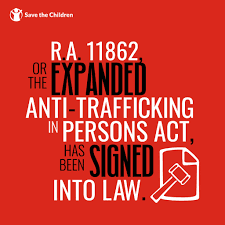Thematic Q2
- Sexual exploitation: Prostitution, pornography, and other forms of sexual abuse.
- Forced labor: Exploiting someone's labor for profit, including domestic work, agriculture, and manufacturing.
- Slavery: Holding someone in servitude against their will.
- Servitude: Being forced to work or provide services under coercive conditions.
- Organ removal or sale: Harvesting organs for profit without the victim's consent.
RA 11862 strengthens the legal framework for combating trafficking by:
- Increasing penalties for perpetrators: The law imposes harsher penalties for trafficking offenses, including longer prison terms and higher fines.
- Expanding the definition of trafficking: The law includes new forms of exploitation, such as online trafficking and forced marriage.
- Providing more comprehensive support for victims: The law provides for more comprehensive support services for victims of trafficking, including medical care, psychological counseling, and legal assistance.
- Strengthening interagency collaboration: The law promotes collaboration between government agencies to effectively combat trafficking
: Safe Spaces Act - Combating Gender-Based Sexual Harassment in Public Spaces
: Safe Spaces Act - Combating Gender-Based Sexual Harassment in Public Spaces
The Safe Spaces Act (RA 11313), enacted in 2019, addresses a crucial aspect of VAW: gender-based sexual harassment in public spaces. This law defines gender-based sexual harassment as any unwanted and uninvited sexual actions or remarks against any person, regardless of the motive. This includes acts like:
- Catcalling: Unwanted remarks directed towards a person, commonly done in the form of wolf-whistling and sexist slurs.
- Wolf-whistling: Making a whistling sound to attract attention, often in a sexually suggestive manner.
- Unwanted invitations: Persistent and uninvited requests for dates or sexual favors.
- Misogynistic, transphobic, homophobic, and sexist slurs: Using derogatory language to demean or insult someone based on their gender or sexual orientation.
- Groping: Touching someone's body in a sexual manner without consent.
- Stalking: Repeated visual or physical proximity, non-consensual communication, or a combination thereof that causes fear or emotional distress.
ReplyForward |




Comments
Post a Comment